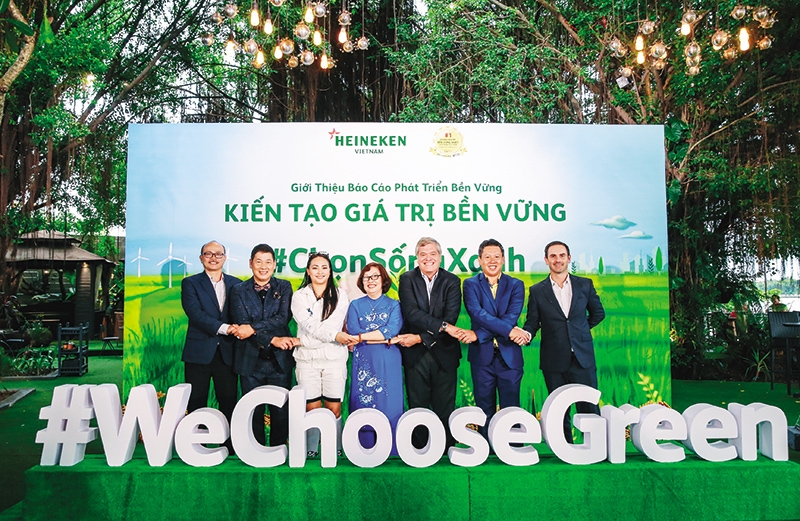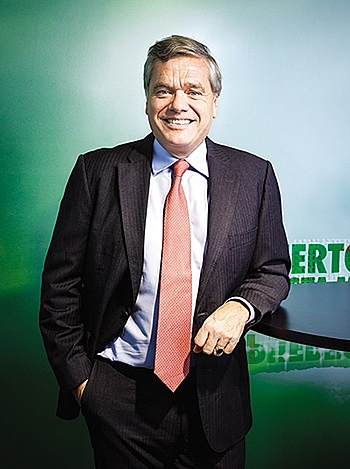HEINEKEN walks the walk to show sustainable path
 |
This year, HEINEKEN Vietnam launched its fifth sustainability report. What are the key achievements? Does the report show significant progress over the last five years?
 |
| Leo Evers |
We are very pleased that our continued efforts over the years have created significant value and progress. This is the fifth year we have released a report, but these practices have been in place since the beginning of our operations. Notably, in 2018 we contributed 0.91 per cent of Vietnam’s total GDP, an increase of 50 per cent compared to five years ago, and supported 166,000 jobs, an increase of more than 40 per cent compared to five years ago. Last year, we initiated one of our first brand-led sustainability campaigns where consumers could recycle Tiger bottle caps to build a bridge for their community. This proved so successful we have already created the second version of this campaign and plan to do more in 2020. In terms of environmental impact, we have reduced our water usage by 20 per cent compared to five years ago. We have also decreased our CO2 emissions in production by nearly 50 per cent compared to five years ago, including four of our breweries now brewing 100 per cent with clean renewable thermal energy, as well as reducing CO2 emissions in logistics by 2,500 tonnes in 2018 alone.
Some of these initiatives are examples of the circular economy model. Can you share more about what the circular economy actually is and how you implement it?
The basics of the circular economy model is to reuse waste or by-products to create new value. As a leading brewer in Vietnam, we understand the importance of reducing waste and taking action to minimise our carbon footprint. Some examples from our business are re-using brewing by-products such as spent grains and surplus yeast for stock feed and fertiliser, as well as taking agricultural by-products such as rice husks for use as biomass.
We also try to reduce the amount of input materials we use in the first place, such as reducing the thickness of our aluminium cans – where a very small reduction can add up to huge savings and CO2 emissions! These practices are applied to our entire value chain whether it is production, distribution, or consumer-facing – the circular economy model is good for both the environment and our company.
Aside from the environment and the company, how would you describe the way HEINEKEN Vietnam creates a sustainability culture amongst stakeholders?
While the idea of sustainability has become mainstream, practical application is still quite limited in Vietnam. We believe one of the best ways for sustainable development to be more widely implemented is through sharing best practices and practical solutions. That is why in 2018 HEINEKEN Vietnam sponsored training on GRI Standards for 100 of our suppliers and sponsored a Train-the-Trainer workshop on circular economy by leading global experts for our employees as well as members of the Vietnam Business Council for Sustainable Development. HEINEKEN Vietnam takes part in numerous forums and workshops to encourage the government, the private sector, and non-profits to engage and inspire others to adopt a sustainability-focused culture.
In order to inspire the wider public to “choose green” and act more sustainably, we also partnered up with singer-songwriter Kimmese to create a rap song titled Our Green Home. We hope to encourage and call for everyone to choose green by taking simple, realistic actions in their everyday life.
You could say that your consumers are also stakeholders and HEINEKEN Vietnam’s When You Drive Never Drink campaign also applies here. How do you measure the impact of this campaign?
In 2018, we continued our longstanding commitment to address drink-driving in Vietnam. This included partnering with the National Traffic Safety Committee (NTSC) to support a nationwide campaign as well as bringing a global behaviour change expert to Vietnam to work with NTSC officers and help improve our programmes. In 2018, our When You Drive Never Drink and Drink Responsibly campaigns reached a combined 30.5 million people.
Changing people’s mindset about drink-driving takes time though, and it can be hard to measure the impact on an annual basis. However, to increase the effectiveness of these campaigns, we brought them even closer to consumers in 2018 by designing a series of interventions in bars and restaurants aimed at stopping someone who might have been tempted to drink and drive. We also used the platform of F1 to further reinforce this message. We used an F1 event in Ho Chi Minh City as an important platform to raise awareness about the When You Drive Never Drink campaign, reaching over 50,000 participants live and millions more online.
Whilst it is not always easy to measure impact, we did receive some validation that our message has gained traction among Vietnamese consumers. At the AFF cup celebrations, one of the Vietnamese football fans raised a cardboard sign with the words “When You Drive Never Drink – Vietnam will be the champion!” This is a great sign that the message is getting through.
What the stars mean:
★ Poor ★ ★ Promising ★★★ Good ★★★★ Very good ★★★★★ Exceptional
Related Contents
Latest News
More News
- State corporations poised to drive 2026 growth (February 03, 2026 | 13:58)
- Why high-tech talent will define Vietnam’s growth (February 02, 2026 | 10:47)
- FMCG resilience amid varying storms (February 02, 2026 | 10:00)
- Customs reforms strengthen business confidence, support trade growth (February 01, 2026 | 08:20)
- Vietnam and US to launch sixth trade negotiation round (January 30, 2026 | 15:19)
- Digital publishing emerges as key growth driver in Vietnam (January 30, 2026 | 10:59)
- EVN signs key contract for Tri An hydropower expansion (January 30, 2026 | 10:57)
- Vietnam to lead trade growth in ASEAN (January 29, 2026 | 15:08)
- Carlsberg Vietnam delivers Lunar New Year support in central region (January 28, 2026 | 17:19)
- TikTok penalised $35,000 in Vietnam for consumer protection violations (January 28, 2026 | 17:15)

 Tag:
Tag:




















 Mobile Version
Mobile Version